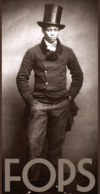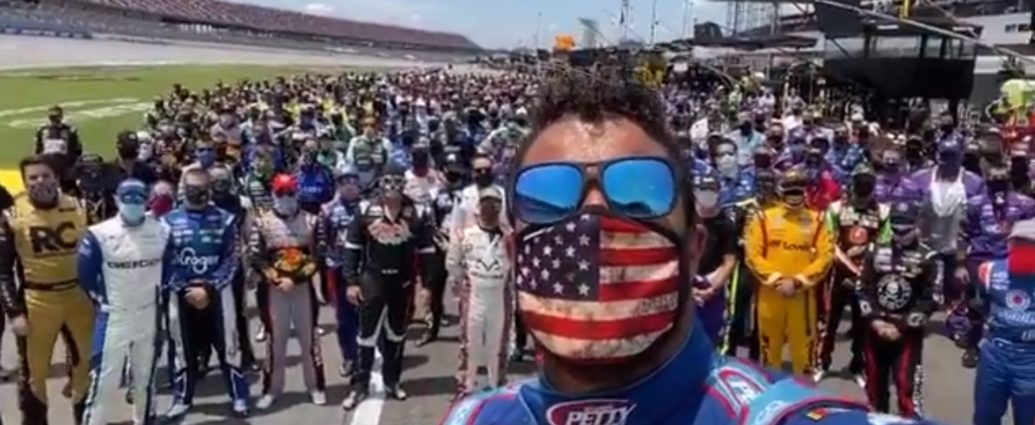Nascar failed to fight racism for 72 years. Don’t praise its support of Bubba Wallace yet
If Nascar hadn’t been so keen to take the path of least resistance in the past, its only black driver would never have been forced down his hard road
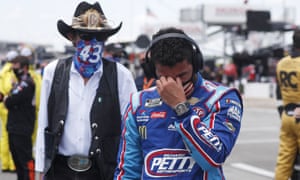
Last Sunday, during a lull in an otherwise raucous Father’s Day celebration with family at his Danville, Virginia, home, Warrick Scott couldn’t help but think of the man who had set up this scene. As rain fell on Alabama and ultimately postponed the Nascar Cup race playing on TV in the background, Scott reached for a biography titled Hard Driving – an unvarnished account of the unrelenting racial prejudice his grandfather, the late Wendell Scott, suffered as the lone black driver competing at the highest levels of stock car racing in the 1960s and 70s.
With Talladega Superspeedway serving as the setting for Sunday’s race, Warrick jumped straight to the sections about Wendell’s own fraught history at Nascar’s fastest oval, lingered on the photo of his grandfather reluctantly shaking hands with Alabama’s segregationist governor George Wallace before a 1973 race, and glowered. “At some point,” mused Warrick, the CEO of an educational non-profit named for his grandfather, “someone’s gonna post that picture as a way to soften the ass kicking that white supremacists are getting right now.”
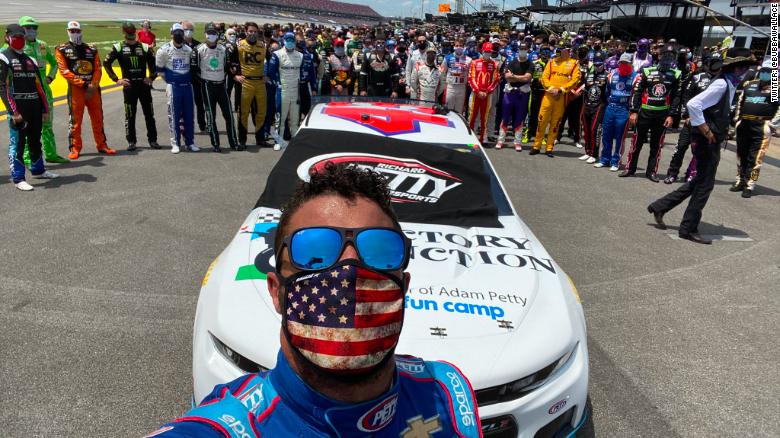
But before Warrick could take solace in redemption, his phone blew up with reports of a noose inside the team garage of Bubba Wallace, the only black driver currently at Nascar’s top level. When Warrick relayed the news to his father, Frank – a constant by Wendell’s side in those much harder days – all Frank could do was sigh. “Welcome to the club,” he said.
The noose incident, which put a bold exclamation point on a race weekend that began with the Confederate flag figured prominently in a 24-car protest and a flyover of the track, represents the strongest backlash yet to Wallace’s successful campaign for a Nascar-wide ban on the stars and bars.
Nascar’s leaders, for their part, said the perpetrator will be banished from the sport.. But by far the most substantial show of support for Wallace came just before Monday’s restart of the Talladega race when an army of his fellow drivers escorted his No43 Chevrolet to the front of the grid in a scene that recalled the 1964 Norman Rockwell painting The Problem We All Live With. “That,” says Warrick Scott of Wallace’s one-car parade, “was a powerful moment.”
Scott began his racing career in a rival stock car series called the Dixie Circuit in 1947, the same year Jackie Robinson crossed baseball’s color line. Back then Scott was the same age Bubba Wallace is now, 26, and coming off an Army stint in the second world war. And though Scott proved quick on that regional stage and in Nascar’s lower rungs, it would take another 14 years before his top-level break in the Grand National series arrived. Nascar founder Bill France struggled to reconcile his respect for Scott’s moxie and resourcefulness with his ambitious vision for the sport and the many Jim Crow whites who backed him.
Although fair to the driver in their one-on-one dealings, France did little to crack down on the wellspring of racism Scott weathered, stoically, from fans (who waved Confederate flags in his face as they rained down vicious slurs on him and his family); or rivals (who sabotaged his equipment and wrecked him on purpose); or officials (who cheated him out of glory, not least in his lone victory in 1963). What’s more, France went out of his way to cultivate a friendship with George Wallace, who counted the Klan among his core constituency, and whom France nonetheless viewed as a key rainmaker for Nascar’s expansion plans. When Wallace deigned to challenge President Lyndon Johnson in the 1964 Democratic primary, France featured Wallace at Nascar events, served as Wallace’s campaign chairman in Florida and gifted the governor free rides on his private planes to canvas the country. France’s reward for all that loyalty? Nascar’s longest oval, a monstrous 2.66-mile stretch of track in the east-central Alabama Piedmont called Talladega.
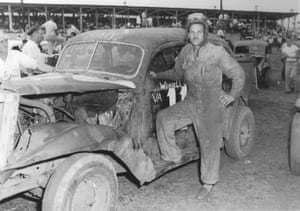
When Scott was forced into that awkward pit lane photo op there with Wallace the year was 1973. Scott’s day ended in a grisly multi-car crash on lap 10 that ultimately ended his 13-year career. But whereas Jackie Robinson was just the beginning of baseball’s integration wave, Scott was a blip. After him, some 13 years later, came Willy T Ribbs, a rightly cocky wheelman who wound up exploiting his talents in road racing. After Ribbs was Bill Lester, a dutiful truck driver who wound up making history as a sports car driver. Then, six years later, came Wallace, whose Nascar career is already half as long as those of Ribbs and Lester combined.
Worst of all, the perpetrator (or perpetrators) of this hate crime remains at large. This, despite the fact that only a limited number of people had access to Bubba Wallace’s team garage. This, despite Talladega’s heavy sprinkling of cameras, plus five video boards that boast facial recognition capabilities. For all of the solidarity that Nascar’s inner sanctum showed in their support of Bubba Wallace on Monday, they better know that this is just the beginning. The crowds are going to get bigger as the circus moves on to Bristol, Daytona and Darlington – where races started with a Confederate flag once upon a time. All the while Wallace will have to face the brunt of Nascar’s legacy of “Southern Pride” alone. And as much as some may be inclined to dismiss his plight as the cost of standing up to injustice, be clear: if Nascar hadn’t been so keen to take the path of least resistance in the past, Wallace never would have been forced down this hard road in the first place.
Americans have had enough …
… and are marching for justice in unprecedented numbers. In small towns and big cities across the country, thousands of people are giving voice to the grief and anger that generations of black Americans have suffered at the hands of the criminal justice system. Young and old, black and white, family and friends have joined together to say: enough.
The unconscionable examples of racism over the last weeks and months come as America’s communities of color have been hit hardest by the coronavirus and catastrophic job losses. This is a perfect storm hitting black Americans. Meanwhile, the political leadership suggests that “when the looting starts, the shooting starts”. The president who promised to end the “American carnage” is in danger of making it worse.
At a time like this, an independent news organisation that fights for truth and holds power to account is not just optional. It is essential. Because we believe every one of us deserves equal access to fact-based news and analysis, we’ve decided to keep Guardian journalism free for all readers, regardless of where they live or what they can afford to pay. This is made possible thanks to the support we receive from readers across America in all 50 states.
